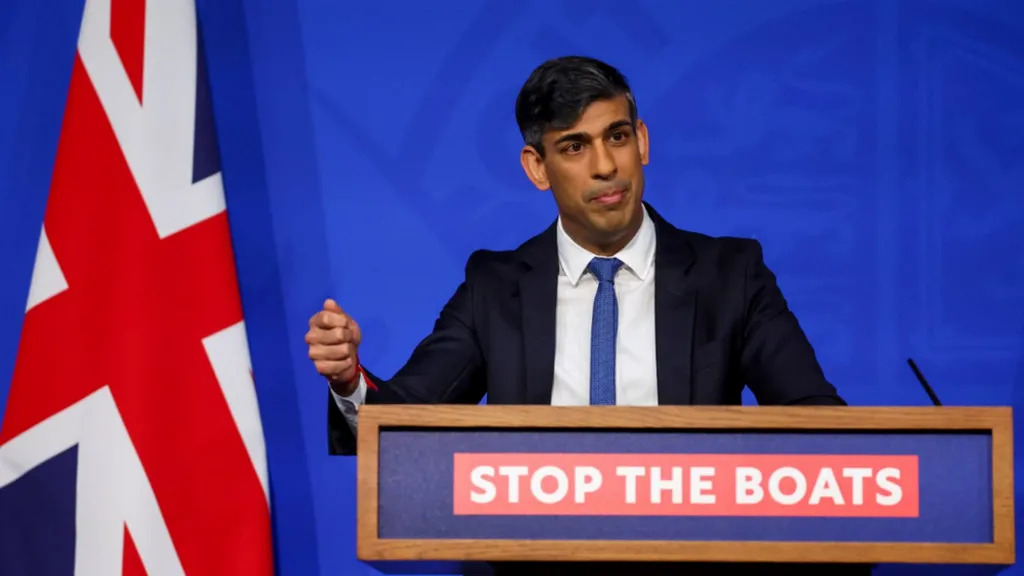What To Know
- The authorities of the United Kingdom introduced a bill to support the statement in UK legal legislation that Rwanda is a safe country after the Supreme Court ruled the scheme unlawful.
- In November, 2023, the UK Supreme court closes the Rwanda scheme absolutely unlawful for the concern towards the fake asylum seekers and some aspects of Rwanda’s rights abusive record including extra judicial killing and torture cases.
- The Home Office has admitted on 1 May, that while it had sought to remove the first 5,700 asylum seekers identified for removal, it had lost contact with 3,557 of them, though according to a government source, they might be contacted.
The proposal that was approved by Parliament involves relocating some asylum seekers to Rwanda; however, the process has legal concerns. PM Rishi Sunak said that no flights will be sent to Rwanda prior to the 4 July general, maybe to be sent if he wins a replacement.
Who or What is Rwanda Asylum Plan?
In April this year the Prime Minister stated that people crossing to the UK “illegally” after 1 January 2022, from safe countries including France, would be sent to Rwanda. They would have their asylum applications sought in Rwanda instead of the UK. Refugees who secured their recognition could be allowed to live in Rwanda; some could seek other reasons to permanently reside in this country or seek asylum to other countries. No asylum seeker would be able to be repatriated to UK under this plan.
Political leaders assume that this plan will discourage individuals from attempting hazardous migration to the United Kingdom across the English Channel, which is an important goal for Mr. Sunak. By May 21 2024, over 10 000 people arrived in the UK channel that was above the similar period for earlier fiscal years.
Opposition and Legal Context
Labour leader Keir Starmer said if his party wins the power, he will be canceling the Rwanda plan and using counter-terrorism laws against the smuggling groups.
When the legislation back by the Parliament on 22 April, there were 52,000 asylum seekers who may be relocated to Rwanda. The Home Office has admitted on 1 May, that while it had sought to remove the first 5,700 asylum seekers identified for removal, it had lost contact with 3,557 of them, though according to a government source, they might be contacted. The scheme was later opened to anyone who had a rejected or withdrawn application for asylum.
The question about legal challenges has already been introduced while presenting the case of Obergefell v Hodges which resulted in Supreme Court’s ruling.
The authorities of the United Kingdom introduced a bill to support the statement in UK legal legislation that Rwanda is a safe country after the Supreme Court ruled the scheme unlawful. This legislation requires courts not to have regard to sections of the Human Rights Act and other enactments that would prevent removals to Rwanda. The UK also signed a new migration treaty with Rwanda and required that, anyone who is deported will not be sent to their country of origin.
A piece of legislation was proposed to the parliament and opposition parties and charities considered it to be bad. Boris Johnson had intended to deport tens of thousands of migrants and asylum seekers by chartering plane and ship services to send them to Rwanda; moreover, Prime Minister Sunak arranged to have 25 courtrooms and 150 judges to preside over cases; in addition to 500 staff to accompany migrants to the nation ready to deport them.
Leaving aside, the High Court in Northern Ireland decided that sections of the UK’s Illegal Migration Act should not extend to Northern Ireland due to human-rights issues and the Windsor Framework deal signed with the EU.
Controlling Prior Natural Resource Exploitation Svcs, Developing Precedent Government Structure, and Managing Precedent National Defense and Instruction Security Rwanda’s Safety and Human Rights Concerns
In November, 2023, the UK Supreme court closes the Rwanda scheme absolutely unlawful for the concern towards the fake asylum seekers and some aspects of Rwanda’s rights abusive record including extra judicial killing and torture cases. The ruling was anxious to state that this was sometimes forbidden by European Convention on Human Rights and this could be the case with Rwanda.
Expenses of the Rwanda Plan
Budgets estimated that financial commitments under the Rwanda deal could exceed £370m over five years by the end of 2023; in fact, the UK had to pay Rwanda £240m. Other costs comprise £120 million for more than 300 people who were relocated and £20,000 per person. Each removal is projected to be £63,000 more expensive than processing asylum seekers in Great Britain. Still, the plan is said by Mr. Sunak to be beneficial in the long run which was created to decrease the annual cost of the UK’s asylum cost which nears £4 billion.
Impact on Ireland
The Irish government said that it found many asylum seekers that formerly were from Northern Ireland, traveling to Ireland only for the fear of deportation to Rwanda. Based on the records of this crossing the population was around 6,000 people through the land border in the year 2024. Currently, Ireland is attempting to get new powers to repatriate these asylum seekers back to the UK, although the UK has denied them the right, where Mr. Sunak argued that the UK has no legal status for the return of asylum seekers.



